Related Research Articles

Politics of the Democratic Republic of Congo take place in a framework of a republic in transition from a civil war to a semi-presidential republic.

Joseph Kabila Kabange is a Congolese politician who served as President of the Democratic Republic of the Congo between January 2001 and January 2019. He took office ten days after the assassination of his father, President Laurent-Désiré Kabila in the context of the Second Congo War. He was allowed to remain in power after the 2003 Pretoria Accord ended the war as the president of the country's new transitional government. He was elected as president in 2006 and re-elected in 2011 for a second term. Since stepping down after the 2018 election, Kabila, as a former president, serves as a senator for life.
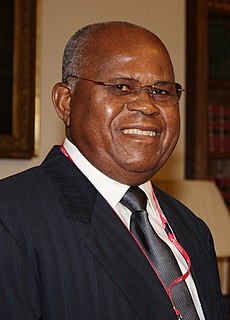
Étienne Tshisekedi wa Mulumba was a Congolese politician and the leader of the Union for Democracy and Social Progress (UDPS), the main opposing political party in the Democratic Republic of the Congo (DRC). A long-time opposition leader, he served as Prime Minister of the country on three brief occasions: in 1991, 1992–1993, and 1997.
The Movement for the Liberation of the Congo is a political party in Democratic Republic of the Congo. Formerly a rebel group operating in the Democratic Republic of Congo that fought the government throughout the Second Congo War, it subsequently took part in the transitional government and is one of the main opposition parties.
Mbuyamu Ilankir "Freddy" Matungulu (born January 4, 1955 Belgian Congo is a Congolese economist. He was Minister of Finance of the Democratic Republic of the Congo from 2001 to 2003.
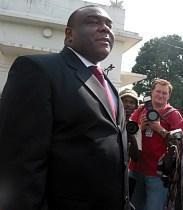
Jean-Pierre Bemba Gombo is a politician in the Democratic Republic of the Congo. He was one of four vice-presidents in the transitional government of the Democratic Republic of the Congo from 17 July 2003 to December 2006. Bemba also leads the Movement for the Liberation of the Congo (MLC), a rebel group turned political party. He received the second-highest number of votes in the 2006 presidential election. In January 2007 he was elected to the Senate.
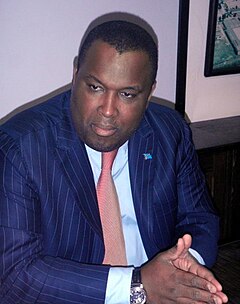
François-Joseph Mobutu Nzanga Ngbangawe is a Congolese politician. A son of the long-time President Mobutu Sese Seko, he served in the government of the Democratic Republic of the Congo under President Joseph Kabila from 2007 to 2011, initially as Minister of State for Agriculture and subsequently as Deputy Prime Minister for Basic Social Needs. He was dismissed from the government in March 2011. In 2008, he founded the Union of Mobutist Democrats as the successor to his father's Popular Movement of the Revolution and has led the party since.

Vital Kamerhe is a Congolese politician who is the chief of staff of President Félix Tshisekedi and leader of the Union for the Congolese Nation (UNC) opposition party. Previously he was the President of the National Assembly of the Democratic Republic of the Congo from 2006 to 2009. After resigning from that office, he went into the opposition and founded the UNC. Kamerhe was a candidate in the 2011 presidential election. In 2018 Kamerhe supported Félix Tshisekedi for president and was made his chief of staff after the election.
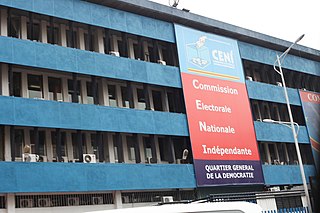
The Independent National Electoral Commission is the body that runs elections in the Democratic Republic of the Congo.

General elections were held in Democratic Republic of the Congo on 28 November 2011; a facultative run-off on 26 February 2012 was shelved with a change in election laws.
The 2011 Democratic Republic of the Congo coup d'état attempt was an alleged coup attempt against President Joseph Kabila on February 27, 2011.

Lemba is one of the 24 communes that are the administrative divisions of Kinshasa, the capital city of the Democratic Republic of the Congo.
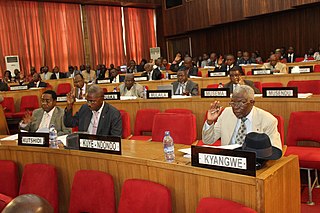
On 19 January 2015, protests led by students at the University of Kinshasa broke out in the Democratic Republic of the Congo. The protests began following the announcement of a proposed law that would allow the country's 43-year-old president, Joseph Kabila, to remain in power until a national census could be conducted. Elections had been planned for 2016 and a census would be a massive undertaking that would likely take several years for the developing country.

General elections were held in the Democratic Republic of the Congo on 30 December 2018, to determine a successor to President Joseph Kabila, as well as for the 500 seats of the National Assembly and the 715 elected seats of the 26 provincial assemblies. Félix Tshisekedi (UDPS) won with 38.6% of the vote, defeating another opposition candidate, Martin Fayulu, and Emmanuel Ramazani Shadary, backed by the ruling party PPRD. Fayulu alleged that the vote was rigged against him in a deal made by Tshisekedi and outgoing President Kabila, challenging the result in the DRC's Constitutional Court. Different election observers, including those from the country's Roman Catholic Church, also cast doubt on the official result. Nonetheless on 20 January the Court rejected his appeal and declared Tshisekedi as the winner. Parties supporting President Kabila won the majority of seats in the National Assembly. Félix Tshisekedi was sworn in as the 5th President of the Democratic Republic of the Congo on 24 January 2019, making it the first peaceful transition of power in the country since it became independent from Belgium in 1960.

On 20 December 2016 the Democratic Republic of the Congo's president, Joseph Kabila, announced that he would not leave office despite the end of his constitutional term. Protests subsequently broke out across the country, which had never had a peaceful transfer of power since it gained independence in 1960. The protests were met with the government's blocking of social media, and violence from security forces which left dozens dead. Foreign governments condemned the attacks against protesters.
Henri-Thomas Lokondo Yoka was a Congolese politician who served as a deputy in the Democratic Republic of the Congo National Assembly from 2011 until his death in 2021. He previously held office as Deputy Minister of Public Works from 1993 until 1994 and Deputy Minister of Foreign Relations from 1996 until 1997. In the 2000s he formed his own party, the Union Congolaise pour la Liberté.
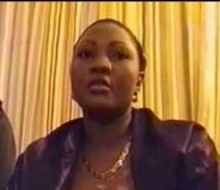
Aimée Kabila Mulengela was the alleged natural daughter of Laurent-Désiré Kabila, president of the Democratic Republic of the Congo (DRC). She was killed in her home by armed intruders on 16 January 2008. Although she had been issued a diplomatic passport as the daughter of Kabila, after her death the government claimed that she was unrelated to the former president.

Marie-Ange Lukiana Mufwankolo, born Mufwankolo, is a politician from the Democratic Republic of Congo. She is the Minister of Gender, Women and Children in the Government Muzito II and also in the government of Muzito III since 11 September 2011.

Colette Tshomba Ntundu is a politician from the Democratic Republic of Congo. She was elected national deputy for the constituency of Funa three times, in 2006, 2011 and 2018.

Félix Antoine Tshisekedi Tshilombo is a Congolese politician who has been the President of the Democratic Republic of the Congo since 25 January 2019. He is the leader of the Union for Democracy and Social Progress (UDPS), the DRC's oldest and largest party, succeeding his late father Étienne Tshisekedi in that role, a three-time Prime Minister of Zaire and opposition leader during the reign of Mobutu Sese Seko. Tshisekedi was the UDPS party's candidate for president in the December 2018 general election, which he was awarded, despite accusations of irregularities from several election monitoring organisations and other opposition parties. The Constitutional Court of the DRC upheld his victory after another opposition politician, Martin Fayulu, challenged the result, but Tshisekedi has been accused of making a deal with his predecessor, Joseph Kabila. The election marked the first peaceful transition of power since the state became independent from Belgium in 1960.
References
- 1 2 3 4 KiAka, Simon (14 May 2005). "Madame Babandoa Odette : Portrait d'une candidate qui change les données pour les élections présidentielles" (in French). Planete Afrique. Retrieved 4 March 2017.
- ↑ "Democratic Republic of Congo: Government List". United Nations Office for the Coordination of Humanitarian Affairs Integrated Regional Information Network for Central and Eastern Africa. 31 March 1999.
- 1 2 3 Stackhouse, John (13 July 2000). "Bribery scandal in Congo entangles Canadians". The Globe and Mail. Retrieved 4 March 2017.
- ↑ "Transport minister arrested". IRIN. 10 July 2000. Retrieved 4 March 2017.
- ↑ "Info-Congo Kinshasa #161". Africa Files. June 2000.
- 1 2 "Country Reports on Human Rights Practices Bureau of Democracy, Human Rights, and Labor 2000". U.S. Department of State. 23 February 2001.
- ↑ "Congo-Kinshasa: Two More Journalists Jailed in Kakese Case". All Africa. 29 August 2000. Retrieved 4 March 2017.
- ↑ "Congo-Kinshasa: One Journalist Released On Bail in Kakese Case". All Africa. 29 August 2000. Retrieved 4 March 2017.
- ↑ Babandoa, Odette (7 April 2006). "Déclaration de Mme Odette Babandoa" (in French). Prince du Fleuve Congo. Retrieved 4 March 2017.
- ↑ "L'UNC dénonce "une démarche politique immorale, irresponsable et frisant la tricherie"". Congo Planete (in French). 6 January 2011. Retrieved 4 March 2017.
- ↑ "Encore une pêche prometteuse pour Vital Kamerhe" (in French). FCE. 4 April 2011. Retrieved 4 March 2017.
- ↑ Kayuba, Jeannot (7 January 2016). "Processus électoral – Odette Babandoa invite la Céni à publier un calendrier électoral détaillé" (in French). All Africa. Retrieved 4 March 2017.
- ↑ "Congo-Kinshasa: Odette Babandoa réagit aux propos de Lambert Mende". La Prospérité (in French). All Africa. 5 January 2011. Retrieved 4 March 2017.
- 1 2 Kayuba, Jeannot (7 January 2016). "Processus électoral : Odette Babandoa invite la Céni à publier un calendrier électoral détaillé". Agence D'Information D'Afrique Centrale (in French). Retrieved 4 March 2017.